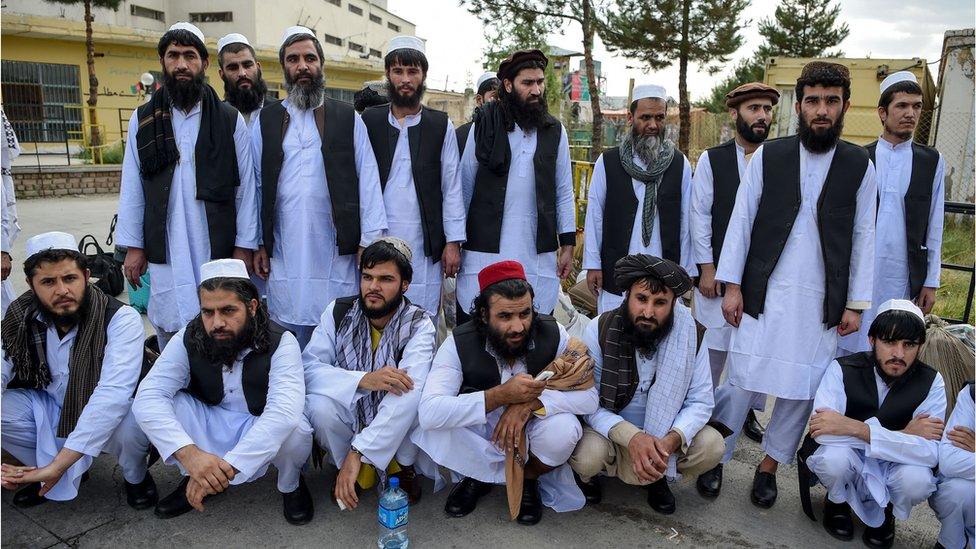Afghanistan conflict: The families caught in crossfire on Helmand front line
- Published
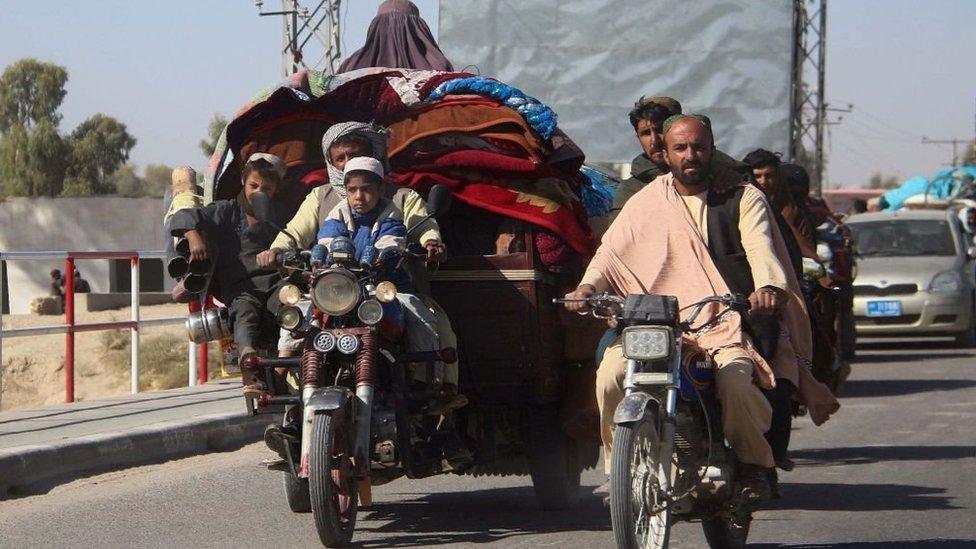
Civilians have been fleeing fighting in Helmand province carrying as much as they can with them
"It was dreadful - the worst ever. Life changed into chaos at once," says Gul Mohammad.
The 25-year-old teacher is struggling to recall how he managed to dodge shellfire and save the 25 members of his family from fighting raging once more in Helmand in southern Afghanistan.
Despite peace talks, a new Taliban offensive is under way. Just a few days before it began Gul Mohammad, whose name has been changed to protect his identity, had been decorating his garden.
As its centrepiece stood a tall tree festooned with balloons - for the family to celebrate the school graduation of their youngest daughter.
"Now our garden is burnt down, for the second time and our house has been turned into a fortress by one side or the other," he told the BBC.
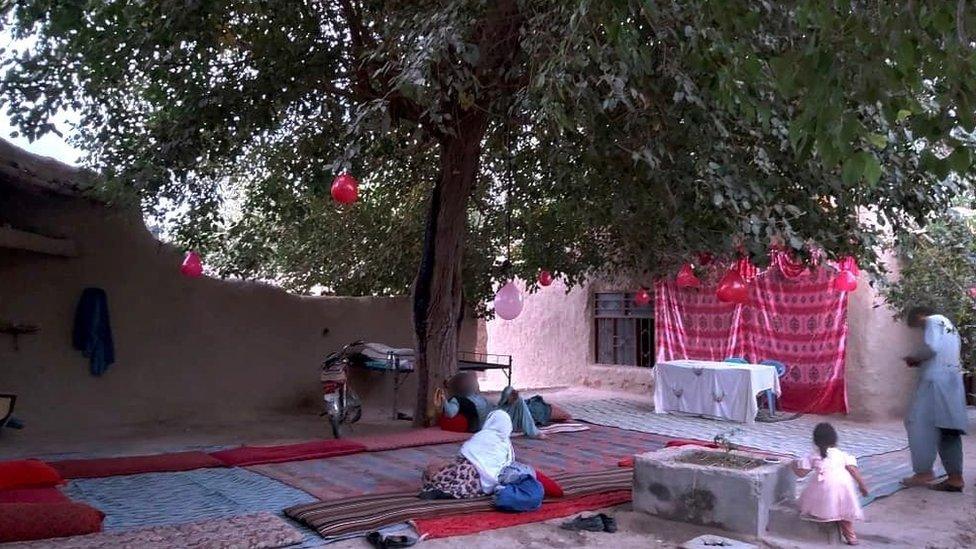
Gul Mohammad's house decorated for his sister's graduation
He, his sisters and the rest of the family have all fled - they spent a night on the road before finding shelter with nine other families in a single house in Lashkar Gah.
"We are around 50 people, living in the kitchens and toilets turned into rooms, a tent in the yard and some of us even on the rooftop," he says.
'Bullets were flying over my head'
Last Saturday, a large Taliban force raided their village, prompting a counter-attack by the Afghan military. Gul Mohammad and his family were among the 35,000 residents forcibly displaced that night.
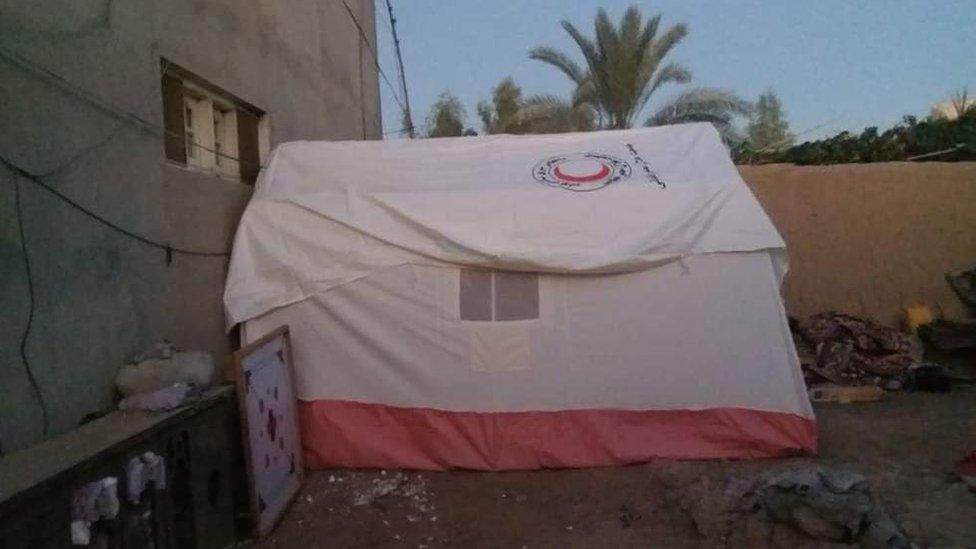
The tent where Gul Mohammad's family are staying in Lashkar Gah
He says he has seen wars but what he witnessed this time he believed belonged only in movies.
The village was one of the first areas to come under attack.
"A rocket landed in our neighbour's house, killing two people. We were close family friends - the rocket killed the 23-year-old mother and her one-year-old son in front of the father."
Gul Mohammad's family fled the area as Taliban fighters closed in. His neighbour had to stay for the funerals.
"We were only 1km away from the shootings, it was dark after evening prayers and I could see exchanges of fire on the streets - bullets were flying over my head. We were just lucky - there was so little separating life from death."
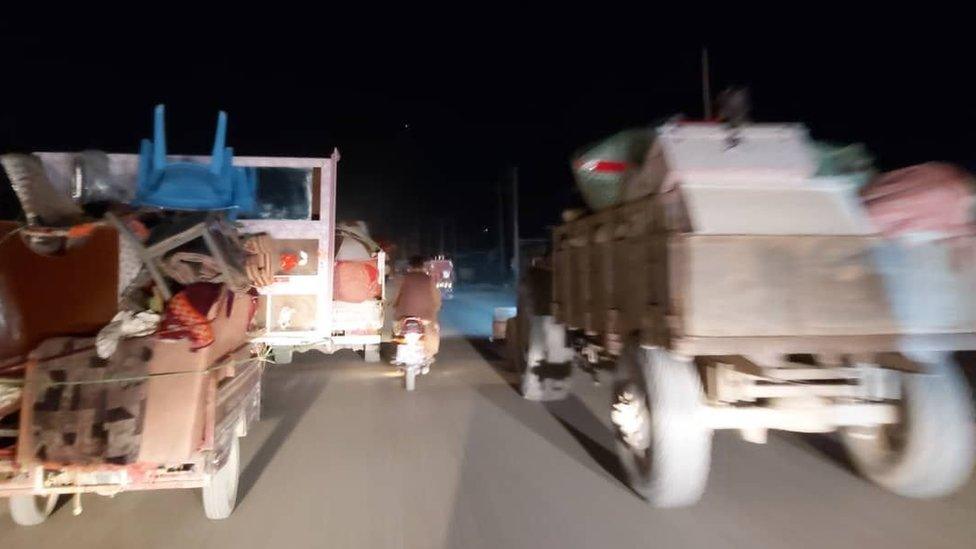
People travelled through the night to the relative safety of Lashkar Gah
Residents like Gul Mohammad who were lucky enough to escape used whatever transport they could find - buses, trucks, motorbikes and even a tractor. They left everything behind.
But some of his relatives are still caught in villages between the Taliban and the army, and couldn't make it to the relative safety of the provincial capital, Lashkar Gah.
Electricity and some telecoms networks have been shut down and the family don't know what happened to those left behind, a source of huge worry, particularly to his elderly mother who is in shock.
The view from Lashkar Gah province on whether peace with the Taliban is possible
Medics treating those caught up in the fighting say the injuries they are seeing show just how bad the situation is.
The youngest victim was a baby yet to be born. Her mother survived a stray bullet as she sat drinking tea with friends, but it hit the foetus she was carrying in her womb. Ultrasound images show the bullet struck the baby's right shoulder.
It had taken five years for her and her husband to conceive.
"They were so thrilled and excited to finally have a child," says Mohammad Forogh, mental health supervisor for medical charity Medecins Sans Frontieres (Doctors Without Borders) in Helmand.
"She told me they even picked names for their baby and had so many plans. Now she doesn't want to go home because it will remind her about the baby."
Staff at the MSF trauma centre in Lashkar Gah are caring for another woman hit by a stray bullet as she fed her eight-month-old baby. Both survived.
Besieged on all sides
Gul Mohammad's family weren't the only ones caught off guard by the offensive.
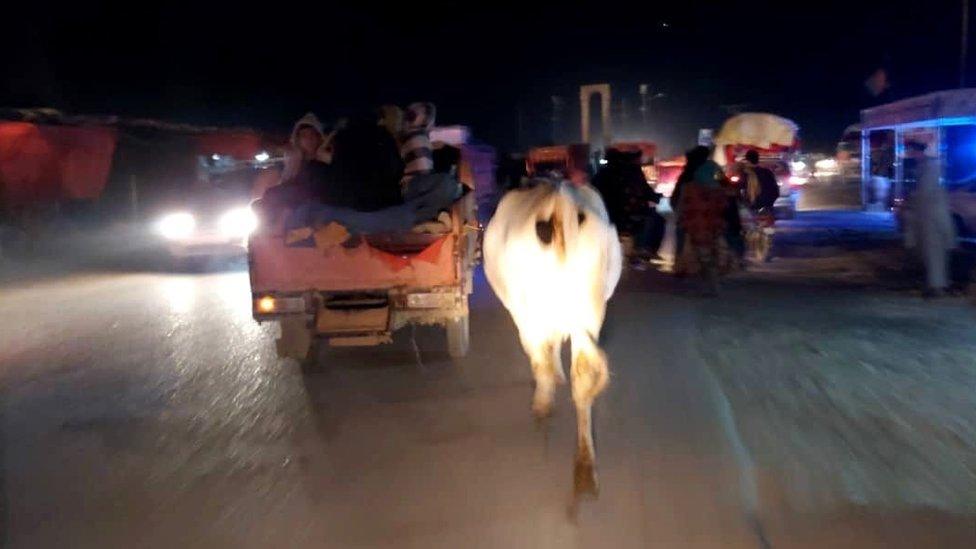
Gul Mohammad's cow also fled to Lashkar Gah
Keramullah, 19, had just started the week preparing livestock and goods to trade at the usual Thursday bazaar but then he heard the Taliban had taken control of a nearby district.
"We felt we didn't have time [to escape]."
By the time they wanted to leave their house, he says, the Taliban fighters had reached the back entrance of their house while government forces were at the front. They were caught in between.
"We have a huge house with a big garden. We even heard aircraft in the air so we really were surrounded on all sides."
Keramullah describes how his older brother managed to speak to both sides to persuade them to let them go.
"We begged them not to shoot us - to let us go and then do whatever you want to each other."
Their house is located near an Afghan military post at the centre of the fighting. Both sides stormed their house during the battle. "Now we know they are using our house as a stronghold - the Afghan army, if not the Taliban."
Keramullah and his mother along with eight brothers and six sisters were the last ones to leave the village after shopkeepers shut the bazaar. He is engaged and was saving money for his wedding in four months.
"Now I don't know if I can do that because everything I saved over the years is gone. All I think about now is how to survive, and how to save the family."
Four years ago, when the village was under similar attacks, he also lost everything, including his young cousin.
'We knew the government couldn't hold out'
For nearly 5,000 families in the Nad Ali, Nawah and Nahr-e Seraj districts, as well as suburbs of Lashkar Gah, life has been rapidly turned upside down, with "significant casualties and striking damage", according to international aid agencies.
Locals remember the heavy fighting four years ago which killed and forcibly displaced civilians.
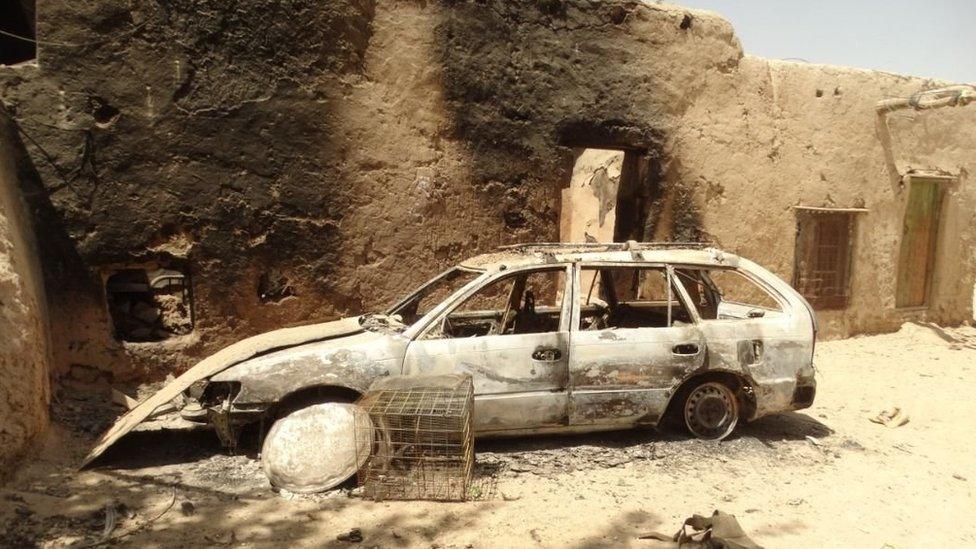
Gul Mohammad lost his car in the 2016 attacks
In August 2016, Taliban forces raided the districts, and the villages where Keramullah and Gul Mohammad lived were some of the first areas they took control of. Both men lost everything back then, and restarted life only to lose it once more.
"The only difference this time is that we were ready because we didn't trust the government as much as we did in 2016," says Keramullah. "This time we knew if an attack came, the government couldn't hold out."
Heavy fighting in 2016 kept Gul Mohammad and his family away for two years, displaced in other districts.
"Four years ago, when the attacks happened, our house was completely destroyed, the trees burnt down and our animals killed," he says. He lost his car, his cows and his sheep - even his university papers.
"We returned to the village and started rebuilding from scratch. It took us two years to just about repair the house, only for these attacks to happen once again."
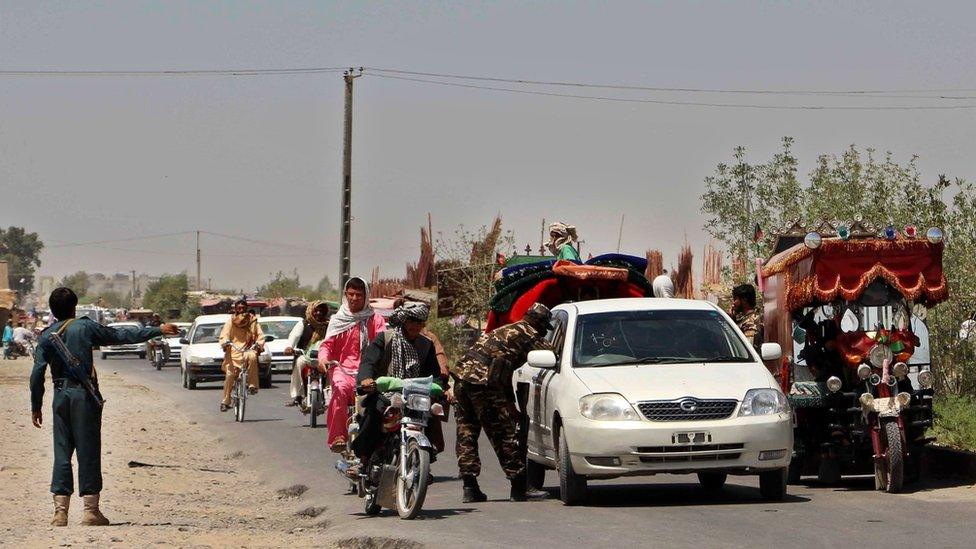
Afghan police search commuters during heightened security and heavy fighting in 2016
The Taliban has been vowing to take control of Helmand for years, but the heavy presence of British troops until 2014 and now US air strikes supporting the Afghan army held the group at bay.
It is a key province in southern Afghanistan, both strategically and as a centre of the country's opium trade, and as such has been a major front throughout years of conflict.
But as the Taliban and government delegation look to continue the peace talks they started a month ago in Doha, and with the clock counting down for US forces who are due to leave Afghanistan in the next few months, there is still no clear end to the battle in sight.
'We just want the war to end'
People like Gul Mohammad and Keramullah are unsure the talks will succeed but they know one thing: they want a permanent truce and no more fighting.
"We just want the war to end. If the government can take control of the area it should run operations so we can return to our homes," says Gul Mohammad.
"But if they can't do that, they should leave the area for the Taliban so we can continue our lives there. They fight and we die."
Tens of thousands of Afghan soldiers have been killed and injured. This is their story
The Taliban and Afghan government blame each other for violating promises not to attack each other's strongholds.
Local reporters say half of the 14 districts of Helmand have been under the intermittent control of the Taliban, and the lack of reinforcements and ammunition are the main reasons for continued attacks in Helmand.
Gul Mohammad says when the Taliban reached the village, everyone fled, including the Afghan police force. "I saw Afghan soldiers were escaping the area - we were in ordinary cars and they had their military vehicles driving faster than us."
The government has said it was a tactical retreat, and two days after the clashes, the Afghan military sent additional troops to retake the districts, under the supervision of the defence minister who was dispatched to the area.
The number of civilian casualties is not yet known, however hospitals are overwhelmed with wounded victims. Roads between Lashkar Gah and affected districts remain closed, raising concern about access to help for those in need.
Many schools are shut.
The government may retake some areas or they may remain under the control of the Taliban.
But for those displaced it will take years just to rebuild a basic life from the ashes of the war, once again.

You may also be interested in:
Zan TV presenter Ogai Wardak: "If the Taliban come, I will fight them"
- Published13 October 2020
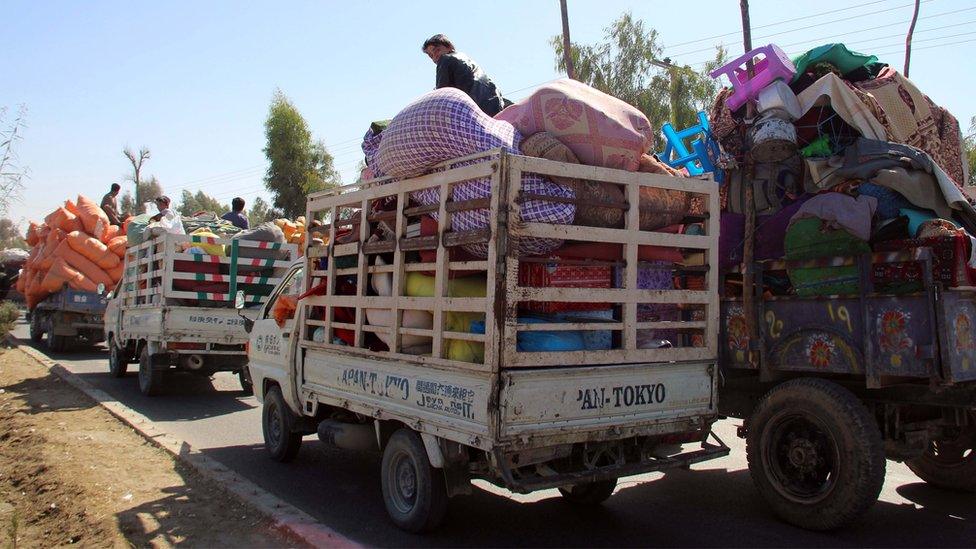
- Published14 September 2020
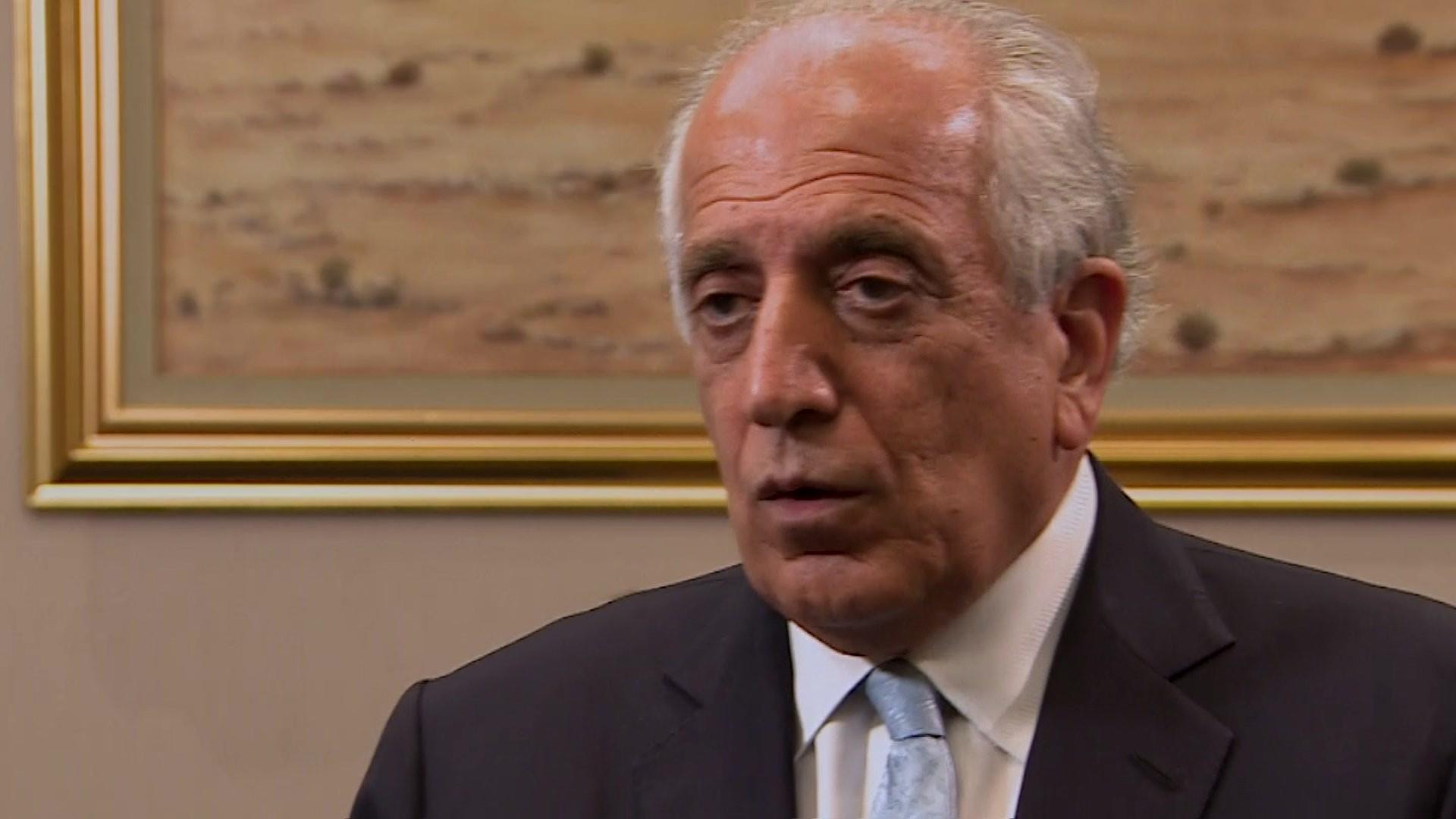
- Published12 September 2020
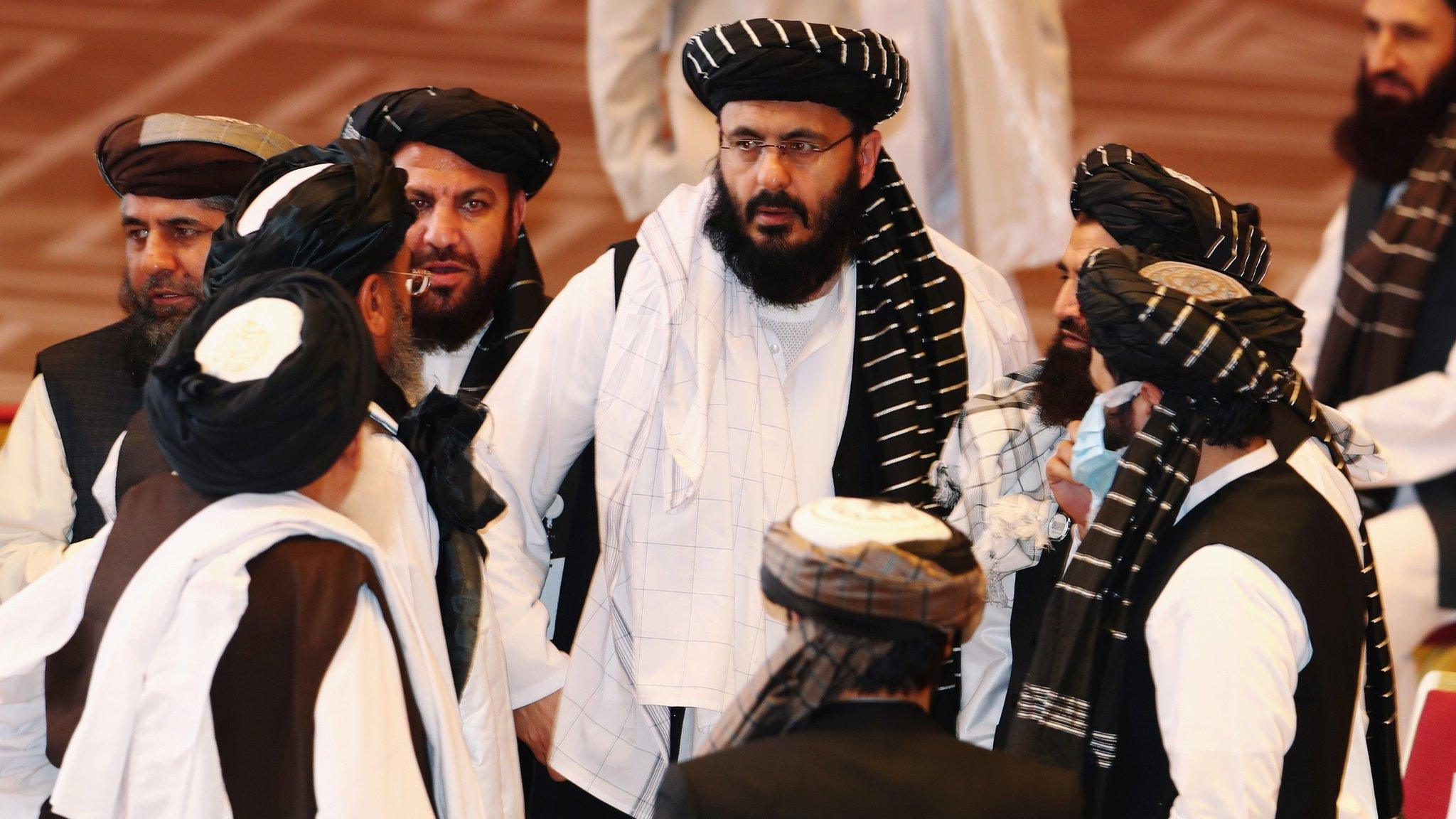
- Published14 August 2020
